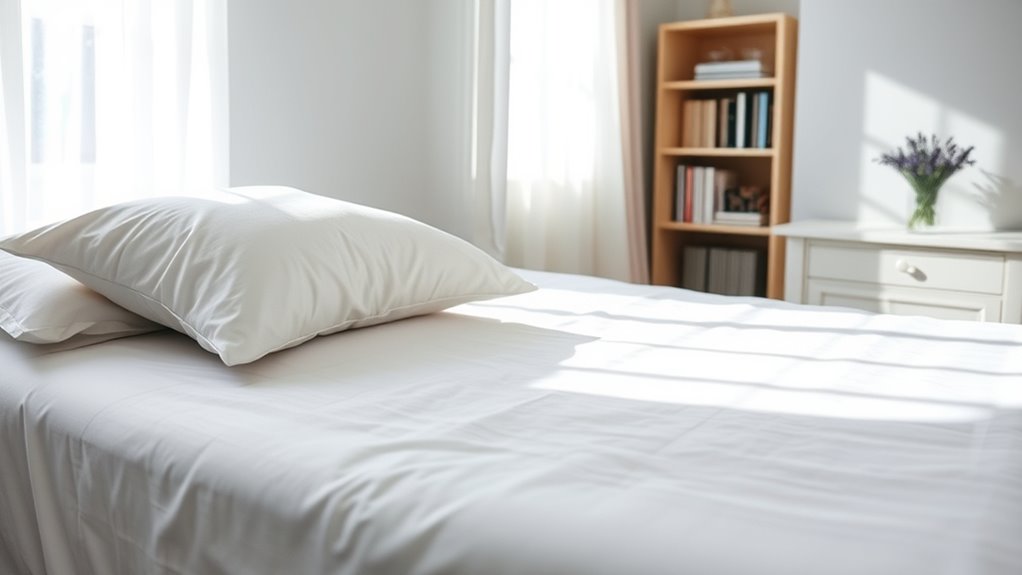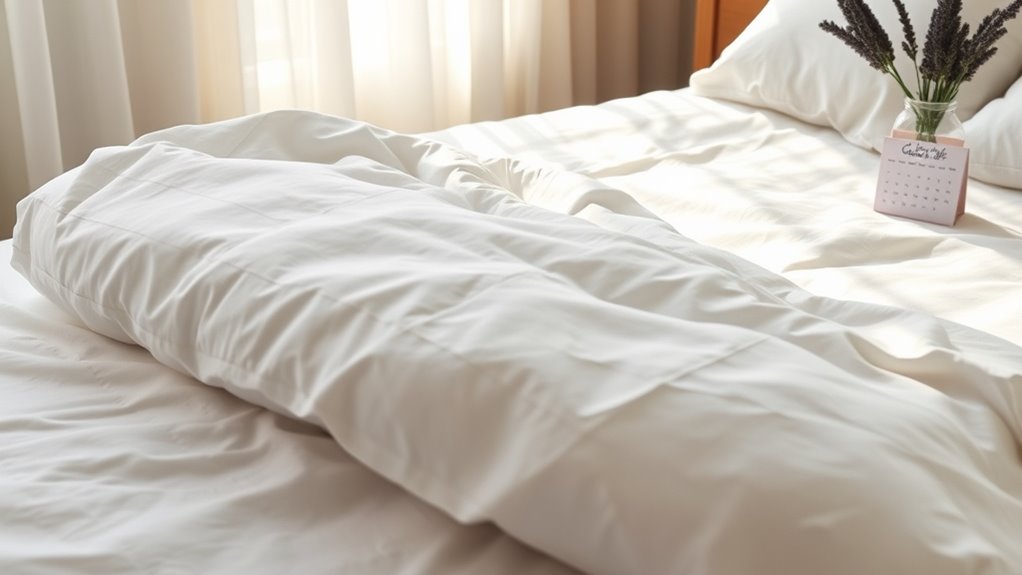You should clean your sheets at least once a week to maintain a healthy and comfortable sleep environment. Regular washing helps reduce allergens, bacteria, and dust mites that can irritate your skin and affect your sleep quality. If you share your bed with pets or people, you might need to wash them more often. Staying on top of your laundry routine can make a significant difference, and there are more tips to help keep your bed fresh and clean.
Key Takeaways
- Wash sheets every one to two weeks to minimize dust mites and allergens in your bedding.
- Use hot water when washing to effectively kill dust mites and bacteria.
- If sharing a bed, increase washing frequency to weekly to manage additional soiling.
- For pet owners, consider washing sheets weekly to reduce hair, dander, and dirt accumulation.
- Maintain a consistent cleaning schedule for better sleep quality and overall health.
Why Once a Week?

Washing your sheets once a week is vital for maintaining a clean and healthy sleep environment. Experts recommend this frequency to combat allergens and bacteria that accumulate in your bedding.
Did you know you shed about 1.5 grams of dead skin daily? This provides a feast for dust mites, making clean sheets essential for your well-being. By washing sheets weekly, you considerably reduce these unwanted guests, leading to a better night’s sleep.
Busy lifestyles might tempt you to skip this chore, but sticking to a routine not only promotes hygiene but also enhances comfort. Don’t let sweat, oils, and skin cells turn your bed into an unsanitary space. In addition, keeping your sleeping environment clean can also improve air quality in your home, contributing to better overall health.
Make it a habit to wash your sheets weekly for ideal health.
Importance of Washing Pillowcases

While you mightn’t think about it often, keeping your pillowcases clean is vital for your skin’s health and overall hygiene. Washing your pillowcases weekly can greatly reduce the risk of skin irritations and acne.
Maintaining clean pillowcases is essential for healthy skin and hygiene; wash them weekly to prevent irritations and acne.
Here’s why regular cleaning is important:
- Prevents the buildup of oils, bacteria, and sweat that can irritate your skin.
- Reduces the transfer of environmental pollutants and hair products to your skin.
- Helps control dust mites and other allergens, improving allergy symptoms.
- Extends the lifespan of your bedding, saving you money in the long run.
Factors Influencing Washing Frequency

Your washing frequency isn’t just a matter of preference; it’s influenced by several factors that affect how quickly sheets become soiled.
Your personal hygiene habits, like showering before bed, can notably impact how fast dirt and oils accumulate. If you sweat a lot during sleep due to warm weather or personal factors, you’ll need to wash your sheets more often.
The number of people sharing your bed also plays a role; more bodies mean more wear and tear, suggesting a need for increased washing.
Additionally, if you’re a pet owner, the hair, dander, and dirt your furry friends bring can prompt you to launder your sheets weekly to maintain hygiene.
Finally, the type of material, such as cotton versus linen, can affect washing frequency as well.
Consequences of Infrequent Washing

Neglecting to wash your sheets regularly can lead to a host of health issues. When you let dirty bedding accumulate, it becomes a breeding ground for dust mites and bacteria.
This can result in:
- Increased skin irritation and acne from trapped skin cells
- Allergic reactions and respiratory issues like asthma
- Poor sleep quality due to discomfort and allergens
- A rise in harmful microorganisms affecting your health
The average person sheds around 1.5 grams of dead skin daily, which only worsens the situation if sheets aren’t cleaned frequently. Additionally, early detection of health issues, such as skin irritations and allergic reactions, can significantly improve your overall well-being.
Regular washing is essential to maintain a hygienic sleep environment and promote better overall health.
Don’t underestimate the impact of clean sheets on your well-being!
How to Keep Your Bed as Clean as Possible

Keeping your bed clean is just as important as washing your sheets regularly. Change your bedding every one to two weeks to reduce oils, sweat, and dead skin cells that attract dust mites.
Change your bedding every one to two weeks to minimize dust mites and maintain a clean, comfortable sleep environment.
When you wash your sheets, use hot water to effectively kill dust mites, especially if someone’s been sick. Avoid making your bed immediately after waking; let your sheets air out to prevent moisture buildup that can lead to bacteria.
Don’t forget to wash your pillowcases weekly, as they trap oils that can cause skin issues. Finally, maintain a consistent washing schedule and have multiple sets of sheets on hand. This habit will help you keep your bed hygienic and comfortable while ensuring you clean your mattress too. It’s also beneficial to ensure that your bedroom has adequate lighting control, as this can help maintain a clean and fresh environment.
Frequently Asked Questions
How Often Should You Realistically Wash Your Sheets?
You should realistically wash your sheets at least once a week to keep your sleep environment clean and healthy.
If you’ve got pets, allergies, or sweat a lot during the night, consider washing them every three to four days.
Don’t forget to wash your pillowcases weekly, too, since they can harbor oils and bacteria.
Having multiple sets of sheets will make it easy to swap out for fresh ones whenever you need.
How Often Should I Wash My Sheets to Prevent Acne?
To prevent acne, you should wash your sheets at least once a week.
If you wear makeup to bed or have oily skin, consider washing them every three to four days.
This routine helps eliminate dirt, oils, and bacteria that can worsen skin issues.
Keeping your sleeping environment clean greatly lowers the risk of breakouts, so make it a habit to prioritize fresh sheets for healthier skin.
Why Do My Sheets Get Dirty so Fast?
Your sheets get dirty fast because they trap sweat, oils, and skin cells from your body.
If you’ve got pets, their hair and dander add to the mess.
Beauty products like lotions and makeup can transfer onto your sheets, making them grime-laden sooner.
Even the occasional snack in bed can leave crumbs that attract unwanted bacteria.
All these factors contribute to a quicker buildup of dirt, prompting you to wash them more often.
What Happens if You Don’t Wash Your Sheets for Months?
If you don’t wash your sheets for months, you’ll find yourself sleeping in a breeding ground for bacteria, dust mites, and allergens.
Dead skin cells, sweat, and oils accumulate, leading to unpleasant odors and potential health issues like skin irritations and respiratory problems.
You might notice a decline in sleep quality, too, as discomfort from allergens disrupts your rest.
Regularly cleaning your sheets is essential to maintain a healthy and comfortable sleeping environment.
Conclusion
In the grand tapestry of restful nights, washing your sheets weekly weaves a thread of comfort and health. Think of your bed as a sanctuary—refreshing it keeps the air crisp and the dreams sweet. While life may sometimes pull you away from this ritual, remember that a clean bed is a hug for your body, guarding against dust and grime. Embrace the habit, and let your sleep be wrapped in the soft embrace of cleanliness.










